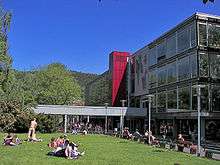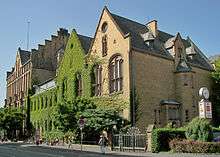University of Marburg
| Philipps-Universität Marburg | |
 | |
| Latin: SCHOLA MARPVRGENSIS | |
| Type | Public university |
|---|---|
| Established | July 1, 1527 |
| President | Katharina Krause |
Administrative staff | ca. 7,500 (incl. hospital staff - 2005) |
| Students | ca. 25,000 |
| Location | Marburg, Germany |
| Website |
www |
 | |
The Philipp University of Marburg (German: Philipps-Universität Marburg), was founded in 1527 by Landgrave Philip I of Hesse (usually called the Magnanimous, although the updated meaning 'haughty' is sometimes given) as one of Germany's oldest universities, dating back to a Protestant foundation. As a state university it no longer has any religious affiliation.
It was the main university of the principality of Hesse and remains a public university of that German state. It now has about 25,000 students and 7,500 employees, making Marburg, a town of 72,000 inhabitants, the proverbial "university town" (Universitätsstadt). Though most subjects are grouped, the University of Marburg is not a campus university in the broader sense. About 12% of the students are international, the highest percentage in Hesse.[1] It offers an International summer university programme every summer and has an awarded ERASMUS programme.
Marburg is home to one of Germany's most traditional medical faculties. The German physicians' union is called "Marburger Bund".
.jpg)



_2.jpg)


History
In 1609, the University of Marburg established the world's first professorship in chemistry. In 2012 it opened the first German participative chemistry museum, called "Chemicum". Its experimental course programme is aimed at encouraging young people to pursue careers in science.[2]
Nazi period
20 professors were expelled in 1933, among them Wilhelm Röpke who emigrated and Hermann Jacobsohn who committed suicide.
Academics
| Ranking | Rank |
|---|---|
| ARWU National | 21 |
| ARWU World | 210[3] |
| QS National | 30 |
| QS World | [4] |
The university is most famous for its life sciences research, but is also home to one of the few centers that conduct research on the middle east, the CNMS (center for near and middle eastern studies). The departments of psychology and geography enjoy an outstanding reputation and reached Excellence Group status in the Europe-wide CHE Excellence Ranking 2009.
According to the 2012 QS Ranking, the university ranked among the top 30 German universities. The ARWU ranking which is more focused on research, ranks the university around 200,[3] with its life sciences and social sciences department in the 151-200 range worldwide.
The strong research is also illustrated by its participation in several SFBs (Sonderforschungsbereiche). These collaborative research centres are financed by the German Science Foundation DFG. They encourage researchers to cross the boundaries of disciplines, institutes, departments and faculties within the participating university. The current SFB at Philipps-University Marburg are:[5]
- SFB/TR17 – Ras-dependent Pathways in Human Cancer (started 2004; with Julius-Maximilians Universität Würzburg)
- SFB/TR22 – Allergic response of the lung (started 2005, with Research Center Borstel and LMU Munich)
- SFB/TR81 - Chromatin Changes in Differentiation and Malignancies (started 2010, with Justus-Liebig Universität Gießen
- SFB-TRR 84 - Innate Immunity of the Lung (started 2010, with Charité Universitätsmedizin Berlin, FU Berlin, Robert-Koch-Institut, Max-Planck-Institut für molekulare Genetik, Max-Planck-Institut für Kolloid- und Grenzflächenforschung, Justus-Liebig-University Gießen)
- SFB 593 – Mechanisms of cellular compartmentalisation and the relevance for disease (started 2003)
- SFB 987 - Microbial Diversity in Environmental Signal Response (started 2012, with Max Planck Institute for Terrestrial Microbiology, Marburg)
- SFB 1083 - Structure and Dynamics of Internal Interfaces (started 2013, with Donostia International Physics Center (DIPC, San Sebastián, Spain))
- SFB 1021 - RNA viruses: RNA metabolism, host response and pathogenesis (started 2013, with Justus-Liebig Universität Gießen)
Famous alumni and professors



Famous natural scientists who studied or taught at the University of Marburg:
- Ludwig Aschoff
- Emil von Behring
- Ferdinand Braun
- Klaus Bringmann
- Robert Bunsen
- Adolf Butenandt
- Georg Ludwig Carius
- Franz Ludwig Fick
- Hans Fischer
- Edward Frankland
- Frederick Augustus Genth
- Johann Peter Griess
- Karl Eugen Guthe
- Otto Hahn
- Johannes Hartmann
- Thomas Archer Hirst
- Erich Hückel
- Karl Hermann Knoblauch
- Hermann Kolbe
- Albrecht Kossel
- Otto Loewi
- Carl Ludwig
- Hans Meerwein
- Ludwig Mond
- Denis Papin
- Heinrich Petraeus (1589–1620)
- Otto Heinrich Schindewolf
- Tawara Sunao
- John Tyndall
- Wilhelm Walcher
- Alfred Wegener
- Georg Wittig
- Alexandre Yersin
- Karl Ziegler
- Theodor Zincke
Marburg was always known as a humanities-focused university. It retained that strength, especially in Philosophy and Theology for a long time after World War II. Theologians include:
- Rudolf Bultmann
- Friedrich Heiler
- Wilhelm Herrmann
- Aegidius Hunnius
- Andreas Hyperius
- Otto Kaiser
- Jacob Lorhard
- Rudolf Otto
- Kurt Rudolph
- Paul Tillich
- August Friedrich Christian Vilmar
Famous philosophers include:
- Wolfgang Abendroth, Political Science
- Ernst Cassirer
- Hermann Cohen
- Hans-Georg Gadamer
- Nicolai Hartmann
- Martin Heidegger
- Hans Jonas
- Friedrich Albert Lange
- Karl Löwith
- Paul Natorp
- Christian Wolff
- Eduard Zeller
- Karl Theodor Bayrhoffer
- Hans Heinz Holz
Other famous students:
- Friedrich Paulus
- Hannah Arendt
- Karl Barth
- Gottfried Benn
- Gerold Bepler
- Georg Friedrich Creuzer
- T. S. Eliot (who had to quit a summer school in August 1914 - at start of World War I)
- José Ortega y Gasset
- Jacob Grimm
- Wilhelm Grimm
- Caspar Friedrich Hachenberg
- Gustav Heinemann
- Beatrice Heuser
- Kim Hwang-sik
- Helmut Koester
- Wilhelm Liebknecht
- Mikhail Vasilyevich Lomonosov
- Carlyle Ferren MacIntyre
- Ulrike Meinhof
- Boris Pasternak
- Ernst Reuter
- Isaac Rülf
- Ferdinand Sauerbruch
- Friedrich Carl von Savigny
- Annemarie Schimmel
- Heinrich Schütz
- Manfred Siebald
- Leo Strauss
- Wilhelm Röpke
- Konstantinos Simitis
- Dmitry Ivanovich Vinogradov
List of subjects
The University of Marburg offers a broad spectrum of subjects with research highlights in nano sciences, material sciences, near eastern studies, and medicine.
- Archaeology
- Biology
- Celtic Studies
- Chemistry
- Christian theology (Catholic)
- Christian theology (Protestant)
- Classic and Koine (New Testament) Greek
- Comparative Linguistics
- Computer sciences
- Dentistry
- Economics
- English studies, American studies
- European Ethnology
- Geography
- Geology (moved to Goethe University Frankfurt)
- German language and literature
- Graphic design
- History
- History of art
- Language technology
- Classic and Medieval Latin
- Law
- Mathematics
- Medicine
- Oriental studies ( significantly enlarged ), Indology, Tibetology
- Peace and conflict studies
- Pedagogy
- Pharmacy
- Philosophy
- Physics
- Political science
- Psychology
- Religious studies
- Romanic languages and literature (French, Italian, Spanish, Catalan, Portuguese)
- Sinology (moved to Goethe University Frankfurt)
- Slavic languages and literature (moved to the University of Giessen)
- Sociology
Collections of the university
- Alter Botanischer Garten Marburg, the university's old botanical garden
- Botanischer Garten Marburg, the university's current botanical garden
- Forschungsinstitut Lichtbildarchiv älterer Orginalurkunden bis 1250 (Collection of photographies taken from medieval charters)
- Bildarchiv Foto Marburg (German national picture archive of arts)
- Religionskundliche Sammlung (Collection of religious objects)
- Deutscher Sprachatlas (Linguistic Atlas of Germany)
- Mineralogisches Museum (Museum of Mineralogy)
- Museum für Kunst und Kulturgeschichte (Museum of Arts)
See also
- List of early modern universities in Europe
- List of universities in Germany
- University hospital Giessen und Marburg
Notes
- ↑ "Uni International - Philipps-Universität Marburg". Retrieved 21 July 2015.
- ↑ ""Chemikum Marburg" hat ein dauerhaftes Domizil". Informationsdienst Wissenschaft e. V. online. 12 February 2011. Retrieved January 23, 2012.
- 1 2 "University of Marburg - Academic Ranking of World Universities - 2014 - Shanghai Ranking - 2014". Retrieved 21 July 2015.
- ↑ "QS World University Rankings - 2012". Top Universities. Retrieved 21 July 2015.
- ↑ "Sonderforungsbereiche - Philipps-Universität Marburg - Referat für Forschung und Transfer - Sandra Basenau". Retrieved 21 July 2015.
External links
Coordinates: 50°48′39″N 8°46′25″E / 50.81083°N 8.77361°E
|